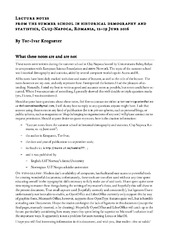The Effect of Ethnicity and Economy upon Intergenerational Coresidence : Northern Norway during the Last Part of the Nineteenth Century
Permanent link
https://hdl.handle.net/10037/4232DOI
doi: 10.1177/0363199011406634View/
This is the submitted manuscript version. Reprinted with permission. Published version available at http://dx.doi.org/10.1177/0363199011406634 (PDF)
Date
2011Type
Journal articleTidsskriftartikkel
Peer reviewed
Author
Jåstad, Hilde LeiknyAbstract
During the last part of the nineteenth century, Finnmark province and the Northern part of Troms experienced a decline in intergenerational coresidence. This article discusses what impact ethnic affiliation and economic activity had on the living arrangements of the elderly, and what contributed to the change. Logistic regression shows that ethnicity played a role, but its effect disappears after controlling for economic activity. Intergenerational coresidence was positively associated with being a married Sámi male with an occupation in farming or combined fishing and farming. As such a person grew older, he was increasingly likely to live separately from an own adult child. This pattern changed towards the end of nineteenth century. By the close of the century, ethnic differences had disappeared, and headship position, irrespective of marital status, was strongly related to coresidence.
Description
This article is part of Hilde L. Jåstad's doctoral thesis. Available in Munin at http://hdl.handle.net/10037/3372
Publisher
National Council on Family RelationsCitation
Journal of Family History 36(2011) nr. 3 s. 263-285Metadata
Show full item recordCollections
The following license file are associated with this item:
Related items
Showing items related by title, author, creator and subject.
-
Lecture notes from the summer school in historical demography and statistics, Cluj-Napoca, Romania, 12–19 June 2016
Krogsæter, Tor-Ivar (Lecture; Forelesning, 2016-06-19) -
Folkemordet i Rwanda - Voldens brutalitet og sivile aktørers deltagelse
Kolstad, Charlotte Renland (Master thesis; Mastergradsoppgave, 2014-05-15)I 1994 ble rundt 800 000 mennesker drept i et lite sentralafrikansk land, størrelsen på landet kan sammenlignes med Troms fylke i Norge. Hendelsen er kjent som folkemordet i Rwanda. I senere tid har det blitt utgitt et relativt bredt spekter av litteratur på feltet, hvor forskere har hatt forskjellige ståsteder som har resultert i ulike synsvinklinger. Prosjektet tar for seg sentrale oppfatninger ... -
Kvinner i sovjetisk og russisk krigsfilm - offer og moralske førebilete
Høgetveit, Åsne Øysteinsdotter (Master thesis; Mastergradsoppgave, 2014-05-16)Oppgåva undersøker korleis kvinnelege soldatar vert framstilt i filmane A zori zdes’ tikhie (Rostotskij 1972) og Leningrad (Buravskij 2007). Om lag ein million kvinner tenestegjorde i dei sovjetiske styrkane under andre verdskrigen. Kvinners krigsdeltaking gjekk langt utover dei tradisjonelle kvinneoppgåvene som helsepersonell og innom administrasjon: Kvinnelege soldatar var skarpskyttarar, pilotar, ...


 English
English norsk
norsk


